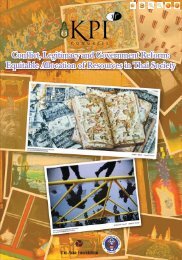SUFFiciENcy EcONOMy ANd GRASSROOtS DEvElOPMENt
SUFFiciENcy EcONOMy ANd GRASSROOtS DEvElOPMENt
SUFFiciENcy EcONOMy ANd GRASSROOtS DEvElOPMENt
Create successful ePaper yourself
Turn your PDF publications into a flip-book with our unique Google optimized e-Paper software.
The Meaning of Sufficiency Economy <br />
International Conference<br />
181<br />
ponds, or other investments in the homestead that would increase self-sufficiency. In<br />
order to resist mainstream materialist values, individuals must cultivate internal<br />
fortitude to imagine and construct an alternative way of life. <br />
Divergent conceptions of development that challenge the hegemony of global<br />
capitalism may emerge from religious or cultural beliefs and ethics or the realities of<br />
alternative economies. Thai social critic Sulak Sivaraksa advocates “true<br />
development” from a Buddhist perspective: <br />
Development must aim at the reduction of craving, the avoidance of<br />
violence, and the development of spirit rather than of material things. . . . The<br />
goal of increasing the quality of life is understood differently. From the<br />
materialist standpoint, when there are more desires, there can be further<br />
development. From the Buddhist standpoint, when there are fewer desires,<br />
there can be further development. (1990:171)<br />
While not necessarily explicitly Buddhist, SE facilitates this attitude<br />
adjustment with its insistence on moderation and reasonableness, which can be<br />
interpreted from a Buddhist perspective. Moderation is the quintessential Buddhist<br />
notion of the Middle Way, the path of neither extreme asceticism nor extreme<br />
luxury. Two Thai concepts relating to moderate consumption were articulated during<br />
my research on the Santi Asoke Buddist Reform Movement (Essen 2005). The first<br />
is mak noi, “to be content with little,” though various Asoke members cautioned:<br />
“Use enough; don’t use little to the level that one is lacking—not a shortage” (Ah Oi<br />
personal communication) because “the Buddha taught to support life by a proper<br />
amount, not to be too needy and not too luxurious, but just right to be able to have<br />
happiness” (Ah Jaenjop personal communication). How much is enough must be<br />
found by each individual. Equally important is sandood, “to be satisfied with what<br />
one has.” This relates to the Buddha’s second Noble Truth that desire—in this case,<br />
wanting more than one already possesses—is the cause of suffering. According to<br />
one Asoke member, “Being content with what one has is important because if [what<br />
you have is] enough, you are richer, suddenly richer” (Ah Wichai personal<br />
communication). Without this feeling of satisfaction, a livelihood may be<br />
sustainable, but it cannot produce real wellbeing.<br />
Of course, moderation is not an exclusively Buddhist notion; it is found in<br />
economies all around the world that value frugality—economizing or minimizing<br />
the means to a certain end. For example, economic anthropologists Gudeman and<br />
Rivera (1990) observed in Columbia that in contrast with profit-driven capitalists,<br />
swidden agriculturalists aim to “sustain” rather than “gain.” Gudeman and Rivera<br />
theorize that subsistence-based economies strive to achieve a level of production<br />
sufficient for the continual reproduction of their system; anything left over (the<br />
surplus) is considered progress. The question remains: what should be done with that<br />
surplus to generate genuine and lasting wellbeing for individuals, society, and<br />
nature?














